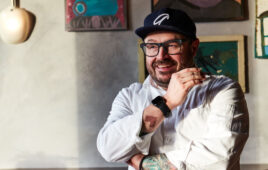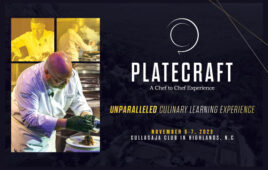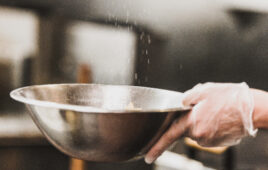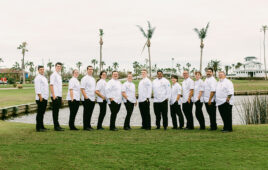 Executive Chef Francisco (Paco) Aceves has brought training from top master chefs and lessons learned at a variety of culinary venues to his new role at Berry Hills CC.
Executive Chef Francisco (Paco) Aceves has brought training from top master chefs and lessons learned at a variety of culinary venues to his new role at Berry Hills CC.
Berry Hills Country Club, in Charleston, W. Va., features a golf course designed by William F. Gordon that is almost 1,000 feet above sea level, to help players beat the heat on summer days in Kanawha County. Members and guests are now also enjoying refreshing food-and-beverage experiences both inside the clubhouse and throughout the property, thanks to changes implemented by Berry Hills’ new Executive Chef, Francisco (Paco) Aceves, who was brought on board by General Manager J. Eric Stacy, CCM, this past February.
| Francisco (Paco) Aceves CHEF PROFILECurrent Position: Executive Chef, Berry Hills Country Club, Charleston, W. Va. (February 2014-Present) Previous Experience:
Education:
Achievements:
|
Chef Aceves brought a very diverse culinary background to Berry Hills, ranging from running his own restaurant in Albuquerque, N.M., to serving as a sous chef at the prestigious Houston Country Club. Since starting his new position, he has created quite a buzz in Charleston, and the club’s cover counts are up. It was a pleasure to speak with Paco and have him share some of his experiences and insights with us.
Q: Chef, having trained and worked under two great Certified Master Chefs, Hartmut Handke and Fritz Gitschner, what did you take away from those experiences that you have integrated into your current day-to-day kitchen operation?
A: This question brings me back to a time in my career where I can remember particular smells and noises of the kitchens. What I learned under Chef Handke was that hard work finds its reward in the pursuit of perfection. He had eyes on everything, and I mean everything. He taught us about total utilization of product and the value of what you were throwing away.
The things that Chef Gitschner taught me were similar, but also widely different. He was always organized and ready for the start of the day. And while both of these CMCs were truly masters in organizing and cooking aspects, working with Gitschner you were taught, aside from the food, how to develop strong organizational and delegation skills.
Q: As a sous chef at Houston Country Club, you saw an interesting concept from Chef Gitschner, with his sous chefs rotating responsibility for catered functions. You do this today at Berry Hills on a smaller scale. Can you describe how it works and what benefits it has for the culinary team?
A: Smaller clubs like ours sometimes cannot afford the luxury of separate banquet and pastry chefs. At Houston Country Club, one of the largest Platinum clubs in the U.S., they had a full brigade working in the kitchen. Sometimes in the absence of the banquet chef, all of the banquet parties were assigned to the working sous chefs for that day. The banquet event orders would have a different chef’s name on it, and you would ultimately be responsible for working and delegating the needed prep. Lastly, at the precise moment, you would pull a team together from the a la carte side to form a plating line.
The benefit to this was that every available hand is used in production. And the banquet menus sometimes offered different styles of menus that you typically wouldn’t get exposure to with a la carte menus.
Q: Houston Country Club was also the training center for the Regional Culinary Olympic Team while you were there. What was the environment like then, and how did you work around regular club business at a very busy property?

Berry Hills CC opened in 1952. Its clubhouse has two member dining rooms, a formal space (jackets requested) on the main level that seats up to 70 diners, and a casual pub for up to 60 on a lower level.
A: Houston Country Club and River Oaks Country Club, also in Houston, were both utilized for the regional culinary Olympic training. My mentor, Kevin Zink, who was Chef de Cuisine at Houston CC at the time, was on the Regional Culinary Team. Both Chef Charles Carroll of River Oaks CC and Chef Gitschner of Houston CC were coaching and mentoring the visiting chefs for their practice sessions.
Most of these sessions were scheduled either very early or late in the day. The culinary staff wouldn’t get a chance to see much of the practice sessions, only the platters they made and kept around for showcasing. It was so nice to get to see the determination and organization among these professional chefs doing amazing food platters with garnishes so fragile that you didn’t want to stare too hard, for fear you’d “break” them.
Everyone knew that these chefs would someday become CMCs or were already Executive Chefs elsewhere, and therefore it became very inspiring to be working in the same kitchen with them.

Chef Aceves now uses a smoker at Berry Hills CC that features a reverse-flow system, to provide even and consistent smoke and heat transfer through the entire unit.
Q: How have you changed as a chef when returning to the club industry, after stints in resort hotels and owning your own restaurant?
A: Each of my experiences has taught me something. In most cases, you know what is expected of you when you take a job. You learn to expect certain challenges and anticipate dealing with a few complaints, usually because of changes made to old menus by those who supported the restaurants previously. Every place has its challenges, and I have found that some places offer more support through leadership and mentoring than others.
I have enjoyed working for hotels, with the structure they offer. Resorts and hotels usually have sister companies, and networking with other chefs in those organizations are some of my fondest memories. Cooking at the James Beard House all three years while I was at Stonewall Resort, which is part of Benchmark Resorts & Hotels, and working alongside the other resort and hotel chefs within the company was an amazing experience.
Owning my own restaurant, on the other hand, was very much like taking online classes. There isn’t an instructor to answer questions or advise you. You are entirely on your own, and it’s up to you to work those 18-hour days to make the business work.
Private clubs offer an opportunity to build good relationships with the membership. In a lot of ways, the support from the club can be very rewarding and the development of the club is always a priority. How do we make things better? Berry Hills Country Club supports my professional development and continues to support my changes to the culinary department.
Q: Upon arriving at Berry Hills, what were the main things you saw that required your immediate attention and focus?
A: Straight away I learned that the culinary leadership was lacking. The staff needed some support from a chef. By working hard every day and being a support to them, I quickly earned their respect.
After a few weeks learning about the club’s history, menus, inventory and assessing the skill set of the staff, it was time to make a few adjustments. The first change was preparing menus that gave some identity to the club and also updated the food, making it healthier and with more flavors. This also required putting key staff in place to execute menu items correctly.
Secondly, the ordering and inventory practices needed to be revamped, to account for the product that was going out and coming back in.
Lastly, being a private club, the only other thing that needed to be focused on was the membership’s input. I evaluated their suggestions and implemented some changes to satisfy their requests.
Q: Chef, you do a ton of smoked foods, as do I. From your time tinkering with the smoking process in your restaurant to your new home at Berry Hills, tell us some of the innovative ways that you have learned to infuse flavors into foods.
A: My first smoker was a standing unit with a firebox in the middle and two gigantic lockers on each side. It was a less-than-preferred unit, but it still worked. Now I am using a smoker [see photo at left] that features a reverse-flow system and offers a very even and consistent smoke and heat transfer throughout the entire unit.
A 12-time BBQ champion shared with me that he uses onions and apples on the coals to add sweetness to the meat. This was awesome advice; it gives the meat the difference between great and fantastic. I use this method with ribs and chicken today, and find that it makes a huge difference in flavor.




